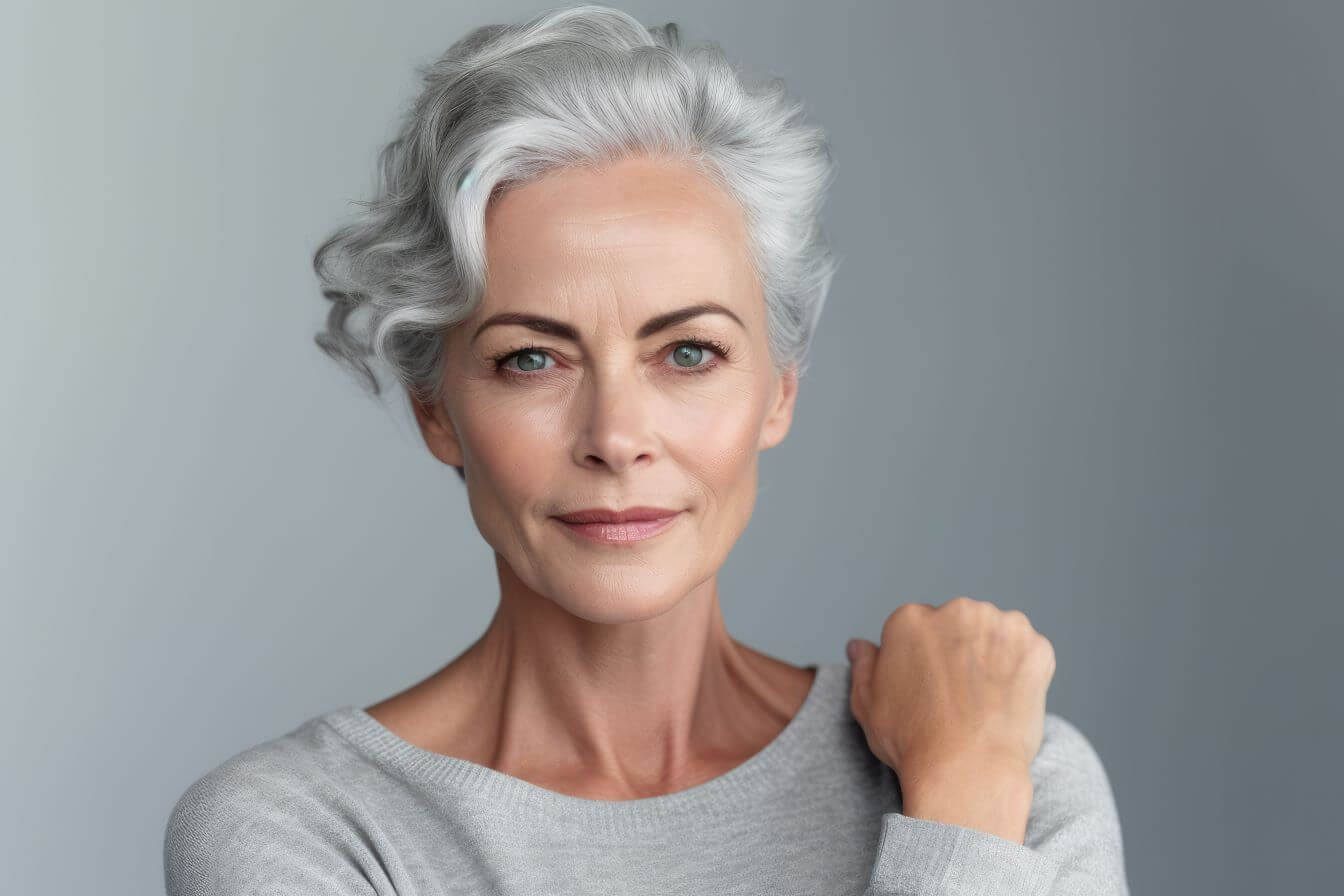Fluctuations in hormone production throughout our lives lead to numerous changes in the way skin looks and feels. For women, menopause is one of the times of greatest change throughout the whole body, and that includes the skin. According to Dr. Alexandra Theriault of U.S. Dermatology Partners affiliate Apex Dermatology in Denver, Colorado, “The bodily changes related to menopause lead to dramatic changes in skin tone, texture, and health. While there is no way to completely prevent the changes that come along with menopause, there are some skincare steps and dermatologic treatments that help diminish the impact of menopause, slow down aging, and correct damage.” In this blog, Dr. Theriault discusses the way menopause impacts skin health and skincare steps to improve your skin’s health and appearance at any age.
Understanding Menopause & Your Skin
The official start of menopause is when there is one full year without a menstrual cycle. Each woman will enter menopause at a different age, but most women experience the first symptoms of menopause in their late forties and early fifties. On average, menopause symptoms last between five and fifteen years, but each person’s experience is different. During menopause, the production of progesterone and estrogen fluctuates. This leads to numerous issues, including hot flashes, exhaustion, changing sex drive, mood swings, and a variety of other concerns. Additionally, skin becomes thinner, moisture retention decreases, skin laxity increases, and acne may develop.
Menopause Skin Changes: A Closer Look
Each woman experiences menopause differently, but as Dr. Theriault says, “Some skin changes occur for almost every woman at some point before, during, and after menopause. This is due to the diminished production of estrogen and progesterone. Additionally, the production of collagen and elastin drops off at this age and skin cell turnover slows. This combination of hormonal changes in menopause and general health changes can lead to a perfect storm of skin health concerns.”
Some of the most common skin changes that occur during menopause include:
- Skin thinning
- Easily damaged (bruised, cut, etc.) skin
- Slower wound healing
- Skin dryness
- More visible skin laxity, wrinkles, and fine lines
- Enlarged pores
- Development of acne
- Redness due to hot flashes
- Rashes and skin irritation
- Uneven skin tone and texture
- Age spots and hyperpigmentation
- Hair loss
- Unwanted facial hair growth
Unveiling the Causes: Hormonal Shifts and Skin Aging
When it comes to the underlying causes of skin changes during menopause, Dr. Theriault says, “Decreased hormone levels, slowed skin cell turnover, and reduced production of collagen and elastin are the main underlying causes of all the negative skin effects related to menopause. It can be frustrating to deal with, but understanding these causes of skin aging and creating a skincare routine to combat them keeps skin looking better at every stage of menopause.”
Specifically, menopause-related health changes have the following impact on skin:
- Loss of collagen and elastin – These building blocks give skin a smooth, supple, youthful appearance. Aging in general decreases the production of collagen and elastin, but the hormonal shifts during menopause further impede the healthy production of these fibers. This decreased production is a major contributor to the development of fine lines, wrinkles, and sagging skin. The breakdown of these fibers can also make pores appear larger.
- Decreased estrogen levels – This hormone helps the body retain moisture. When estrogen levels diminish during menopause, skin often becomes very dry. This decrease in estrogen production can also lead to slower wound healing.
- Lack of progesterone – This hormone stimulates and regulates the production of the body’s sebum (oils) that provide natural hydration. Lack of progesterone is another contributor to skin dryness during menopause.
- Androgen production – Androgens are the male sex hormones. For most women, these hormones do not fluctuate during menopause, so they are present at the same levels with fewer female hormones to balance them. This leads to numerous concerns, including an increase in sebum, which contributes to acne and blocked pores. It can also lead to the development of unwanted hair, especially on the face as well as loss of hair on the head.
- Changing pH balance – The skin’s pH will also change due to the fluctuation in hormone levels, which can cause the skin to become more sensitive, leading to an increased risk of irritation and skin rashes. This may be especially true for those who have sensitive skin or chronic skin conditions like rosacea or eczema.
- Sun damage – This isn’t necessarily related to menopause. Instead, the effects of sun damage are cumulative, and they become more noticeable in the same timeframe that women are going through menopause. The most common long-term effect of sun damage is hyperpigmentation. This can cause small spots often referred to as liver spots, though they have nothing to do with the liver, or sun spots, and it may also result in larger areas of skin that are darker in tone compared with the surrounding areas. The cumulative effects of skin damage also mean a greater risk for skin cancers and pre-cancers.
Skincare Regimen: Protecting Your Skin During Menopause
When it comes to keeping skin healthy throughout menopause, Dr. Theriault says, “Skincare is important, but beautiful, healthy skin starts from the inside out. You need to stay hydrated, eat a nutrient-rich diet, get plenty of rest, exercise, limit alcohol consumption, and take steps to cope with stress. This will put you on the right track to looking and feeling your best at any age. From there, work with your dermatologist to develop a daily skincare routine, plan for any dermatologic treatments you may need, and schedule a skin cancer and general health screening once a year.”
The following anti-aging skincare routine for menopause is effective for most women:
- Cleanser – A gentle cleanser should be the first step in every skincare routine. During menopause, consider switching to a cream-based cleanser rather than a gel or foaming cleanser. This will help balance pH without stripping away moisture. For morning and evening use, a cream-based cleanser is the best option. However, the slowing of skin cell turnover is also a concern, so you’ll need to make sure to exfoliate regularly without stripping moisture or irritating skin. Revision Skincare Papaya Enzyme Cleanser offers gentle exfoliation that won’t irritate the skin. Exfoliation can also improve the appearance of dark spots, fine lines, and wrinkles.
- Toner – A good toner balances pH without irritating skin. The EltaMD Skin Recovery Essence Toner is a great option for aging skin. This toner hydrates skin, soothes irritation and inflammation, and balances pH.
- Serum – In the morning, you should utilize protective and hydrating serums like MD Skin Essentials Fortify. This serum works to protect against aggressors and improve the appearance of fine lines and wrinkles. The best daytime serums should be formulated with antioxidants like Vitamins C, E, and B5. Another great solution is the ZO Skin Health Illuminating AOX Serum. Additionally, skinbetter Science Alto Advanced Defense and Repair Serum and SkinCeuticals CE Ferulic offer comprehensive defense against free radicals from pollutants and sunlight. If you’re looking for a good B5 serum, SkinCeuticals Resveratrol BE delivers advanced hydration for smooth, more youthful skin. Finally, you may want to utilize a growth factor serum like ZO Skin Health Growth Factor Serum to diminish fine lines and wrinkles and improve the appearance of skin as well as hydrating and strengthening the skin’s protective barrier.
- Retinol – Daily retinol use promotes healthy skin cell turnover and encourages the production of collagen and elastin. MD Skin Essentials Energize promotes skin cell turnover and collagen and elastin production while incorporating ingredients that soothe skin to prevent irritation and other common adverse effects of retinol use. ISDIN Melatonik Overnight Recovery Serum is another nice plant-based retinol oil, formulated with bakuchiol and Vitamin C.
- – Because the skin is thinner and has more difficulty retaining moisture during menopause, it’s important to use a heavier moisturizer in the morning and evening. Revision Skincare D.E.J. Face Cream and Night Face Cream work well to deliver adequate moisture all day long and hydrate skin overnight. Sente Dermal Repair Cream provides advanced hydration to repair sun damage and improve the appearance of photo-damaged skin. For those seeing the effects of glycation and decreased collagen production, SkinCeuticals AGE Interrupter Advanced offers exceptional results that truly turn back the clock. Loss of cellular lipids leaves skin looking less smooth and plump, but the SkinCeuticals Triple Lipid Restore 2:4:2 uses an innovative combination of lipids to plump up skin cells and restore a beautiful, youthful appearance. Dr. Theriault says, “I also really like MD Skin Essentials Hylacream as it is light enough for morning and evening use, yet has a potent cross-linked hyaluronic acid that pulls 500,000 times its weight of water into the skin.”
- Eye cream – The skin around the eyes is always thinner, so it’s extremely important to apply eye cream in the morning and evening to keep this sensitive skin hydrated. choose an eye cream that will keep skin moisturized while addressing other concerns like sagging skin, wrinkles, puffiness, or dark circles. SkinCeuticals A.G.E. Eye Complex helps address all of these common signs of aging.
- Sunscreen – Even though the effects of sun damage begin in your early years and accumulate as you age, it’s still important to protect your skin from further damage later in life by applying sunscreen every day. The best sunscreen should be broad-spectrum and have an SPF of 30 or higher. A tinted sunscreen has the added protection against visible and blue light. This is especially important for patients who struggle with melasma. In addition to applying sunscreen to all areas exposed to the sun before leaving home for the day, it’s important to reapply if you’ll be out in the sun for an extended time.
If you’re looking to simplify your shopping, we offer several amazing anti-aging skincare lines in convenient kits or bundles. Consider these options:
ZO Skin Health Anti-Aging Program – This moderate skincare program is perfect for the reduction of early or significant signs of aging. This five-product regimen includes an exfoliating cleanser, and exfoliating polish, complexion renewal pads, Daily Power Defense, and Growth Factor Serum.
SkinCeuticals Anti-Aging System – This high-performance clinical system is designed to help improve the appearance by reducing wrinkles, age spots, and other advanced signs of skin aging. The three-product regimen includes CE Ferulic, A.G.E. Interrupter, and Resveratrol BE.
Embracing Change: Navigating Skin Health Through Menopause
According to Dr. Theriault, “Good skincare at every stage of life is an essential step to keep skin healthy and looking its best. During menopause, the right skincare products and routine become even more important. You can’t prevent every change that comes along with menopause, but a dermatologist can help you minimize the negative effects of menopause on your skin. With a personalized skincare routine, you can keep feeling confident and beautiful at every age.”
Work with a Trusted Professional
Are you going through menopause and dealing with the many changes to your body? Our readers and dermatologists would love to hear from you. If you’re interested in learning more or developing a personalized menopause skincare routine, take a few moments to complete our scheduling request form to reach out to a local U.S. Dermatology Partners practice. We look forward to hearing from you.
Find a location near me
or


